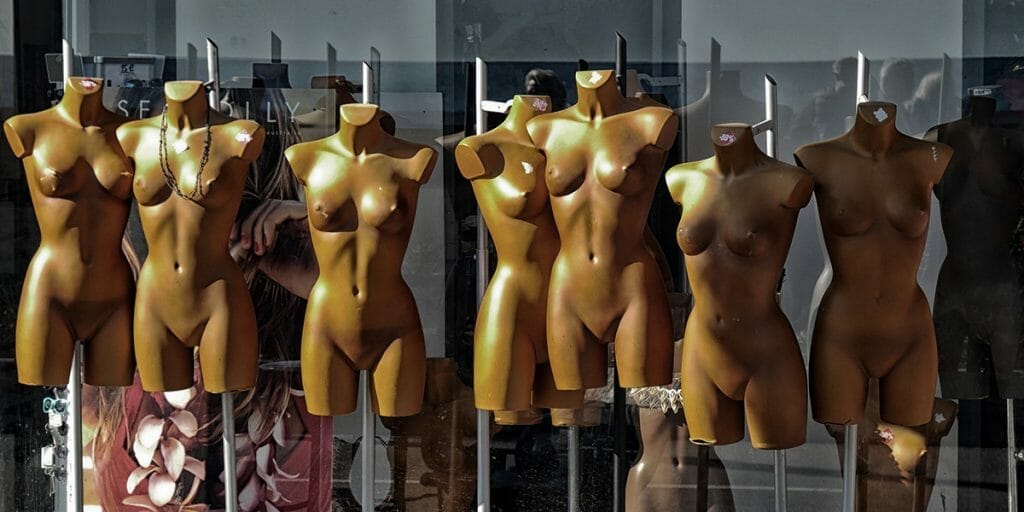 In a week of political defections and naked activists appearing on TV and radio to discuss the matters around Brexit, it’s clear that divisions in the opinion of the electorate continue to pull apart established norms. The structural changes proposed by the UK’s impending exit from the European Union are far more complex and convoluted than were proposed and ‘sold’ and outcomes far less clear than promised.
In a week of political defections and naked activists appearing on TV and radio to discuss the matters around Brexit, it’s clear that divisions in the opinion of the electorate continue to pull apart established norms. The structural changes proposed by the UK’s impending exit from the European Union are far more complex and convoluted than were proposed and ‘sold’ and outcomes far less clear than promised.
Yet entrenched views on both sides continue to hold ground and despite the ever-mounting evidence of economic disappointment rather than sunny uplands it seems only a small percentage of voters have changed their mind. Now you may be thinking why are we reading about Brexit in a newsletter about health?
Well there are a couple of analogies that bear close examination and understanding that reflect deeply held views in which the level of understanding is at best skimpy and the emotional hold disproportionately strong.
 The first is the continued willingness of medical journals to seek to denigrate nutritional research and then watch the ensuing media discourse repeat questionable or strongly opinionated views across the various news landscapes. Recent attempts by the BMJ with their new nutrition focussed journal is to be applauded and certainly their detailed discussion on the methodology employed in determining nutrition related outcomes is an interesting read. However there continues to be a belligerent anti nutrition and especially an anti nutrition supplement community, which at times makes its way into respected journals without, it appears, considered review.
The first is the continued willingness of medical journals to seek to denigrate nutritional research and then watch the ensuing media discourse repeat questionable or strongly opinionated views across the various news landscapes. Recent attempts by the BMJ with their new nutrition focussed journal is to be applauded and certainly their detailed discussion on the methodology employed in determining nutrition related outcomes is an interesting read. However there continues to be a belligerent anti nutrition and especially an anti nutrition supplement community, which at times makes its way into respected journals without, it appears, considered review.
Whilst reporting failed trials as well as positive trials is something all research should encourage the role of peer review is coming under increasing scrutiny – yet as in Brexit, despite the evidence to the contrary, entrenched views are hard to challenge and achieve respectful change.
Colleagues Dr Alex Vasquez and Dr Joe Pizzorno have published an editorial in the Journal of Integrative Medicine, and it’s a must read. They explore the nature of some recent negative trials and the knowledge base of the intended audience with regard to nutrition, and in doing so open up a number of interesting points – for example what determines the level of comprehension needed to interpret research papers, and if the peer reviewers are conflicted as well as the researchers, what hope is there that the outcomes will be meaningful – or at least justify interventional reassessment?
The second area is in regard to the changing landscape of our planet, regardless of the cause, change is occurring at a pace that is affecting all of life from small insects to large mammals. Yet we know at senior government levels there is resistance to recognising the need for change despite the increasing wealth of evidence that confirms events are becoming unstoppable.
Biodiversity is being lost at a rate 100 times greater than background rates in pre-human times, because of, for example, deforestation, urbanisation, and climate change.[1] As a health care practitioner it can seem overwhelming in terms of what impact you as an individual can have as human health and natural systems are interdependent. Yet you do have a vital part to play in reducing the environmental impact of health services; increasing resilience to environmental change; by supporting healthy, sustainable behaviours; and advocating for policies to protect planetary health, favouring healthy foods and social interactions.
If we do not at least press back against these changes at a personal level, communicate to our charges a rationalised non-polarised view of what and why things are changing we are avoiding further responsibility. The driving forces that are behind intransigence and related long-term implications are all too insidious and pervasive. Yet at board rooms across the world many leaders are awakening to the need to change and are seeking ways to do it, driven by consumer demand and frustration with the existing models.
Some things need to change others just need to evolve, all need to be evaluated – for which we need access to scrupulous advisers and commentators – a state of affairs that rarely occurs as the last 2 years exploring the separation of the UK from the EU has revealed.
[1] De Vos JM, Joppa LN, Gittleman JL, Stephens PR, Pimm SL. Estimating the normal background rate of species extinction. Conserv Biol. 2015 Apr;29(2):452-62

3 Comments. Leave new
Interesting
BREXIT and nutrition
The common factor is the media manipulation and corporates with deep pockets that inform the media and keep the debate one sided
If everyone had ready access to all information they would probably make different decisions
Most people just go along with the establishment view still trusting the media to give them all the information necessary which is far from the truth. They are reticent to look at alternative soures of information as they would rather believe in the status quo. It is called cognitive dissonance.
The powers that be are keen for us to stay in the EU. Its all about power and they want our money. They use scare tactics to get us to vote for them, same as doctors ‘you will die if you don’t take this drug’ etc
The EU is basically a power grab , the same as the soviet union. The Euro is unsustainable and has destroyed the jobs of millions in the southern European countries. SInce they control the media all you hear is the scare stories which are untrue but do depend on having politicians that know how to manage an economy which we don’t have.
It all boils down to corruption. The head of the IMF has been convited of fraud whcih carries a years prison sentence, however she still keeps her job and the sentence is not enforced. These are the poeple who want to control our lives. Centralised power will not have a good outcome.
Hello Sam – thanks for commenting. Stepping aside from the emotive commentary ‘media manipulation’ ‘powers that be’ ‘power grab’ ‘corruption’ which whilst they have some credence tend to provide exactly the ‘cognitive dissonance’ suggested in your commentary. Festinger’s (1957) cognitive dissonance theory suggests that we have an inner drive to hold all our attitudes and behaviour in harmony and avoid disharmony (or dissonance). As such voices of both sides that rely on the triggering of emotive discontent are driving people to tend to hold their originating views despite apparent clarity.
Let me suggest an example.
It has been promulgated by the ‘Free Trade’ proponents that World Trade Organisation (WTO) agreements will just pick up trade agreement stability if we were to exit the current trading block with no agreement:
Yet, we do not do the bulk of our trade with the rest of the world “on WTO terms”. Nor shall we ever want to in future. The government, including all the leading Brexiteers in the cabinet, must know this. Liam Fox and his department are making strenuous though not very impressive to date efforts to ensure that as many as possible of the free trade agreements with non-EU countries we have via EU membership get “rolled over”, with no change, into British agreements. Then they promote or exult the ‘success’ of retaining what we already have (i.e we are no better off).
Yet this is proving much harder than was promised – and why the extravagant claims of 2016 about what would be in place by the end of March 2019 are no nearer to being fulfilled than all the other boasts we were exposed to. You see free trade agreements have vastly better trading terms than those with reliance solely on WTO agreements. He is desperate to ensure that trade does not, in the event of no-deal, become markedly less free with these countries, which would put us at a major disadvantage compared with EU competitors with whom we currently operate on a level playing field.
Negotiations even between willing parties are in terms of trade complex and lengthy, seeing a chance to enhance their position over that agreed with the EU it’s natural that the Brexit described friends want to seek a gain at this juncture – at our cost.
Two-thirds of our total global trade is either with countries with whom we have a free trade agreement virtue of EU membership or with the EU itself. Even in the remaining third, for example, the US, there are critical trade facilitating agreements which go way beyond what adherence to WTO commitments alone would give us. Those all fall away in a no-deal world.
Which is why, rightly (although this was never explained at the beginning), the trade department is running to preserve the lot, solely to try to stand still.
The totally unsubstantiated “let’s go WTO”, “clean break” rhetoric one hears from avid proponents of a no-deal Brexit is economic insanity. It is not a liberation: it would be a deliberate, massive act of self-harm and protectionism, pushed by people masquerading as free traders who do not run commercial trade related enterprises.
For all the perceived sovereign elements that are ‘returned to us’ sought by stepping away, the country relies on the importation of over 70% of consumer goods, parts, information etc. all of which will be impacted. Seeing a further depreciation in currency predicated by no deal – despite Mr Davis’s view that it will liberate exports which it has failed to do so despite a 20% fall since the vote as an export expansion model has never worked anywhere in the world. It simply results in us importing inflation – costs that are ultimately passed onto the consumer.
If we had been told at the beginning that what was easy was in fact very hard, would have continued impact on the ability of the country to maintain economic stability (by setting out the challenges as they exist in reality) and recover further from the post 2008 events, would as many have voted to leave? For whilst dissonance vis ‘project fear’ is a poor way to inform or evolve understanding, everyone knows that its much more difficult to improve anything if the economic capabilities of the country is compressed. It may be that this is seen as a fair exchange, but we do not yet know what that exchange is – we know what we have, we are yet to discover what we do not have…. Hence anyone can make things up, good or bad. Our view is that its almost impossible to plan without a clear path hence no one invests or engages in changes because of the uncertainty – that will have an effect and generally it will be less advantageous than we have been led to expect.
Sobering but timely article, by Vasquez and Pizzorno – thank you so much for sharing. Let’s hope it’s read by those who bear some responsibility for the bias that has been creeping in to the world of research.